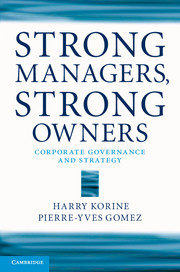autres publications Nouvelles diverses
An Effective Compliance and Ethics Program is key
Ivan Tchotourian 30 juillet 2016
Intéressant document de la Securities and Exchange Commission en matière de criminalité économique : « 2014 GUIDELINES MANUAL – CHAPTER EIGHT – SENTENCING OF ORGANIZATIONS ».
These guidelines of the U.S. Sentencing Commission (Chapter 8) offer incentives to organizations to reduce and ultimately eliminate criminal conduct by providing a structural foundation from which an organization may self-police its own conduct through an effective compliance and ethics program. The prevention and detection of criminal conduct, as facilitated by an effective compliance and ethics program, will assist an organization in encouraging ethical conduct and in complying fully with all applicable laws.
In regard to ‘economic criminality’, however defined, it is equally crucial that regulators across the globe push and pull robustly and cooperatively for effective compliance and ethics programs within industries. Without regulatory/supervisory efforts (a situation that is a systemic risk by itself), ‘economic criminality’ will be nothing more than an academic subject of theoretical interest without any consumer protection values whatsoever. That may well be where the next financial crisis lies. Only the future will tell.
À la prochaine…
Ivan Tchotourian
autres publications Gouvernance Nouvelles diverses
Strong managers, strong owners : un ouvrage pour cet été ?
Ivan Tchotourian 28 juillet 2016
Harry Korine et Pierre-Yves Gomez ont publié un ouvrage qui vient de rejoindre ma bibliothèque : « Strong Managers, Strong Owners: Corporate Governance and Strategy » (Cambridge University Press, décembre 2013).
The family firm preparing generational change, the partnership that welcomes new partners, and the shareholders of a firm that chooses to go public are making decisions that will have an impact on strategy and management. Conversely, a change in strategy such as a move to diversify or a decision to take on more risk in a business can make the firm more attractive to some shareholders and less attractive to others and is therefore not ownership neutral. Opening the black box of agency theory, Korine and Gomez show how management and ownership interact to shape the strategy of the firm. In their view, the critical question to ask is not what is the best strategy, but rather, who is the strategy for? With numerous detailed examples, Strong Managers, Strong Owners is an invaluable resource for company owners, board members and executives, as well as their advisors in strategy and governance.
Voici la table des matières :
Part I. Changes in the Identity of Ownership and Management:
1. Change in ownership
2. Change in management
Concluding remarks
Part II. Changes in the Form of Ownership and Organization:
3. Change of legal structure
4. Change of organizational structure
Concluding remarks
Part III. Changes in Strategy:
5. Corporate and business strategies
6. Despite failure, NO change in ownership, management, or strategy
7. Because of success, reinforcement of ownership, management, and strategy
Concluding remarks
Part IV. Implications for Corporate Governance:
8. The board of directors
Conclusion – strategy for whom?
À la prochaine…
Ivan Tchotourian
autres publications Nouvelles diverses
Bientôt un nouvel ouvrage : The Oxford Handbook of Corporate Law and Governance
Ivan Tchotourian 27 juillet 2016
Voilà un ouvrage que tous les spécialistes vont bientôt s’arracher : « The Oxford Handbook of Corporate Law and Governance » (Oxford University Press, à paraître dans quelque temps).
Corporate law and corporate governance have been at the forefront of regulatory activities across the world for several decades now, and are subject to increasing public attention following the Global Financial Crisis of 2008. The Oxford Handbook of Corporate Law and Governance provides the global framework necessary to understand the aims and methods of legal research in this field.
Written by leading scholars from around the world, the Handbook contains a rich variety of chapters that provide a comparative and functional overview of corporate governance. It opens with the central theoretical approaches and methodologies in corporate law scholarship in Part I, before examining core substantive topics in corporate law, including shareholder rights, takeovers and restructuring, and minority rights in Part II. Part III focuses on new challenges in the field, including conflicts between Western and Asian corporate governance environments, the rise of foreign ownership, and emerging markets. Enforcement issues are covered in Part IV, and Part V takes a broader approach, examining those areas of law and finance that are interwoven with corporate governance, including insolvency, taxation, and securities law as well as financial regulation.
The Handbook is a comprehensive, interdisciplinary resource placing corporate law and governance in its wider context, and is essential reading for scholars, practitioners, and policymakers in the field.
À la prochaine…
Ivan Tchotourian
autres publications mission et composition du conseil d'administration Normes d'encadrement Nouvelles diverses place des salariés
Système allemand de codétermination : un modèle exportable ?
Ivan Tchotourian 22 juillet 2016
Alors que Theresa May a fait part de son intérêt d’importer en Grande-Bretagne le système allemand, MM. Horst Eidenmüller, Mathias Habersack, Caspar Behme et Lars Klöhn reviennent sur la pertinence de cette proposition en jetant un regard prudent (de chercheurs !) sur ce système : « Corporate Co-Determination German-Style as a Model for the UK? » (18 juillet 2016).
On 13 July 2016, Theresa May took up office as Prime Minister of the United Kingdom. Only shortly before, she had made headlines when she proposed to adopt European-style worker representation on the boards of leading companies.
Corporate co-determination hence seems to gain a certain degree of popularity with the British government – which is highly astonishing, considering that it was the UK which most fiercely fought against co-determination on a European level. It was mainly the diverging views of the UK and Germany on co-determination which have thwarted projects like the Draft Fifth Company Law Directive or the establishment of a European Private Company (Societas Privata Europaea, SPE). It is downright ironic that while the UK now shows an interest in co-determination, the concept is being questioned in Germany after decades of lying dormant. The reason for the new German discussion of co-determination are doubts regarding the compatibility of its specific form of co-determination with higher-ranking Union law. This post provides a brief overview of the most recent developments in German co-determination law that were the focus of a joint Oxford/Munich conference at the Ludwig-Maximilians-Universität (LMU) in Munich in March 2016.
À la prochaine…
Ivan Tchotourian
autres publications
Commonsense Corporate Governance Principles : un appel qui doit être entendu
Ivan Tchotourian 22 juillet 2016
Les 13 bonzes du secteur économique américains ont exposé une série de principes auxquels ils voudraient voir adhérer les entreprises américaines inscrites en Bourse (voir les affaires.com) : Commonsense Corporate Governance Principles. Ces principes touchent le rôle, les responsabilités et la composition des conseils d’adminstration; les plans de succession; la rémunération des dirigeants; les droits des actionnaires; le rôle des grands gestionnaires de portefeuille; et la communication des données financières.
Voici un résumé des principes (ici) :
Truly independent corporate boards are vital to effective governance, so no board should be beholden to the CEO or management. Every board should meet regularly without the CEO present, and every board should have active and direct engagement with executives below the CEO level;
Diverse boards make better decisions, so every board should have members with complementary and diverse skills, backgrounds and experiences. It’s also important to balance wisdom and judgment that accompany experience and tenure with the need for fresh thinking and perspectives of new board members;
Every board needs a strong leader who is independent of management. The board’s independent directors usually are in the best position to evaluate whether the roles of chairman and CEO should be separate or combined; and if the board decides on a combined role, it is essential that the board have a strong lead independent director with clearly defined authorities and responsibilities;
Our financial markets have become too obsessed with quarterly earnings forecasts. Companies should not feel obligated to provide earnings guidance — and should do so only if they believe that providing such guidance is beneficial to shareholders;
A common accounting standard is critical for corporate transparency, so while companies may use non-Generally Accepted Accounting Principles (“GAAP”) to explain and clarify their results, they never should do so in such a way as to obscure GAAP-reported results; and in particular, since stock- or options-based compensation is plainly a cost of doing business, it always should be reflected in non-GAAP measurements of earnings; and
Effective governance requires constructive engagement between a company and its shareholders. So the company’s institutional investors making decisions on proxy issues important to long-term value creation should have access to the company, its management and, in some circumstances, the board; similarly, a company, its management and board should have access to institutional investors’ ultimate decision makers on those issues.
À la prochaine…
Ivan Tchotourian
autres publications normes de droit responsabilisation à l'échelle internationale
Nouvel ouvrage sur la responsabilité limitée : « Limited Liability: A Legal and Economic Analysis »
Ivan Tchotourian 17 juillet 2016
Stephen Bainbridge et Todd Henderson vont publier au mois de septembre 2016 leur dernier ouvrage portant sur la responsabilité limitée des actionnaires : « Limited Liability: A Legal and Economic Analysis » . Assurément un ouvrage à avoir dans une bibliothèque de droit des affaires !
. Assurément un ouvrage à avoir dans une bibliothèque de droit des affaires !
The modern corporation has become central to our society. The key feature of the corporation that makes it such an attractive form of human collaboration is its limited liability. This book explores how allowing those who form the corporation to limit their downside risk and personal liability to only the amount they invest allows for more risks to be taken at a lower cost.This comprehensive economic analysis of the policy debate surrounding the laws governing limited liability examines limited it not only in an American context, but internationally, as the authors consider issues of limited liability in Britain, Europe and Asia. Stephen Bainbridge and M. Todd Henderson begin with an exploration of the history and theory of limited liability, delve into an extended analysis of corporate veil piercing and related doctrines, and conclude with thoughts on possible future reforms. Limited liability in unincorporated entities, reverse veil piercing and enterprise liability are also addressed. This comprehensive book will be of great interest to students and scholars of corporate law. The book will also be an invaluable resource for judges and practitioners.
À la prochaine…
Ivan Tchotourian
autres publications normes de droit Structures juridiques
Billet d’humeur sur Contact : L’organisation juridique de l’entreprise sociale (2 de 2)
Ivan Tchotourian 15 juillet 2016
Bonjour à toutes et à tous, je viens de publier mon nouveau billet sur le blogue Contact de l’Université Laval : « L’organisation juridique de l’entreprise sociale (2 de 2) ».
Plusieurs organisations juridiques sont susceptibles de soutenir une activité marquée par une finalité environnementale ou sociale. Dans le billet précédent, nous avons présenté l’organisme de bienfaisance, l’organisme à but non lucratif et la coopérative. Je me tourne maintenant vers 2 entreprises à vocation commerciale, mais qui ont quelque chose que les autres n’ont pas: elles ne sont pas exclusivement commerciales.
Se développe aujourd’hui un nouveau type d’entreprise qui, revêtant la forme traditionnelle d’une société par actions, s’en distingue par son objet social et son respect de certains des principes particuliers. La tendance mondiale est en effet à la création de ces entreprises dites «hybrides». De plus, n’oublions pas que les entreprises commerciales traditionnelles à visée lucrative s’ouvrent à la responsabilité sociale des entreprises (RSE). Comme l’affirment certains: «Social entrepreneurship: it’s for corporations too».
À la prochaine…
Ivan Tchotourian



